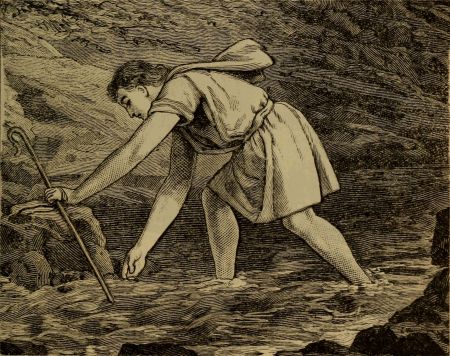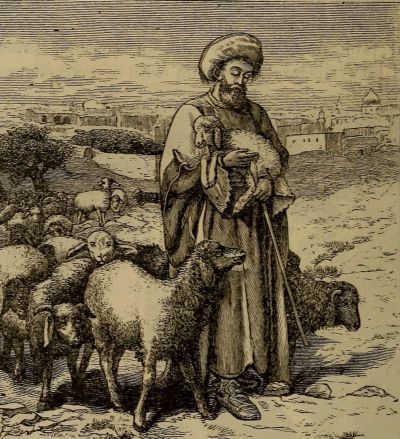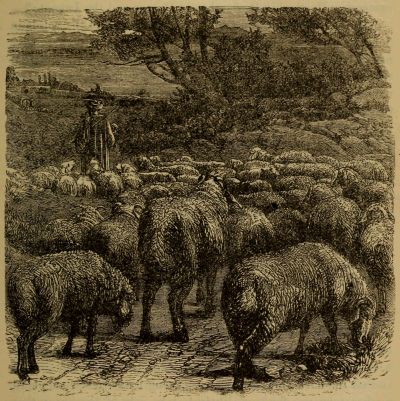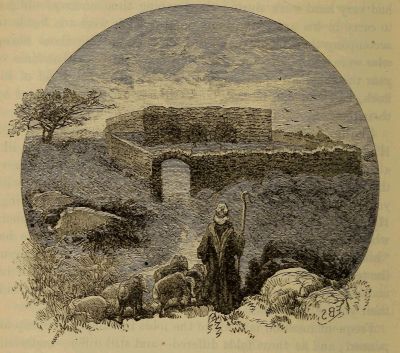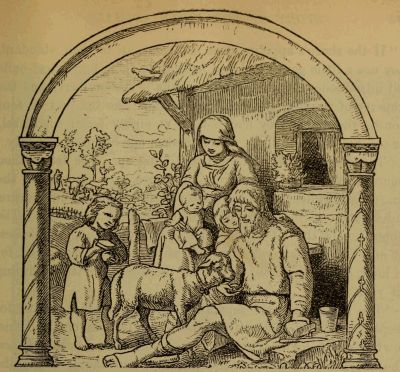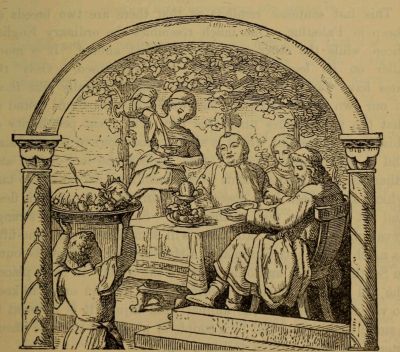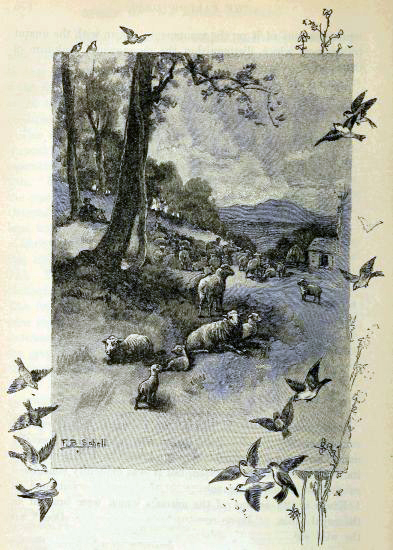
The bulk of the following text is from The Story of the Bible Animals by J. G. Woods.
“Story of the Bible Animals by J. G. Wood.” Project Gutenberg, gutenberg.org/ebooks/44685
THE SHEEP.
Importance of Sheep in the Bible—The Sheep the chief wealth of the pastoral tribes—Arab shepherds of the present day—Wanderings of the flocks in search of food—Value of the wells—How the Sheep are watered—The shepherd usually a part owner of the flocks—Structure of the sheepfolds—The rock caverns of Palestine—David’s adventure with Saul—Use of the dogs—The broad-tailed Sheep, and its peculiarities.
“We now come to a subject which will necessarily occupy us for some little time.
“There is, perhaps, no animal which occupies a larger space in the Scriptures than the Sheep. Whether in religious, civil, or[177] domestic life, we find that the Sheep is bound up with the Jewish nation in a way that would seem almost incomprehensible, did we not recall the light which the New Testament throws upon the Old, and the many allusions to the coming Messiah under the figure of the Lamb that taketh away the sins of the world.
“In treating of the Sheep, it will be perhaps advisable to begin the account by taking the animal simply as one of those creatures which have been domesticated from time immemorial, dwelling slightly on those points on which the sheep-owners of the old days differed from those of our own time.
“The only claim to the land seems, in the old times of the Scriptures, to have lain in cultivation, or perhaps in the land immediately surrounding a well. But any one appears to have taken a piece of ground and cultivated it, or to have dug a well wherever he chose, and thereby to have acquired a sort of right to the soil. The same custom prevails at the present day among the cattle-breeding races of Southern Africa. The banks of rivers, on account of their superior fertility, were considered as the property of the chiefs who lived along their course, but the inland soil was free to all.
“Had it not been for this freedom of the land, it would have been impossible for the great men to have nourished the enormous flocks and herds of which their wealth consisted; but, on account of the lack of ownership of the soil, a flock could be moved to one district after another as fast as it exhausted the herbage, the shepherds thus unconsciously imitating the habits of the gregarious animals, which are always on the move from one spot to another.
“Pasturage being thus free to all, Sheep had a higher comparative value than is the case with ourselves, who have to pay in some way for their keep. There is a proverb in the Talmud which may be curtly translated, “Land sell, sheep buy.”
“The value of a good pasture-ground for the flocks is so great, that its possession is well worth a battle, the shepherds being saved from a most weary and harassing life, and being moreover fewer in number than is needed when the pasturage is scanty Sir S. Baker, in his work on Abyssinia, makes some very interesting remarks upon the Arab herdsmen, who are placed in conditions very similar to those of the Israelitish shepherds.
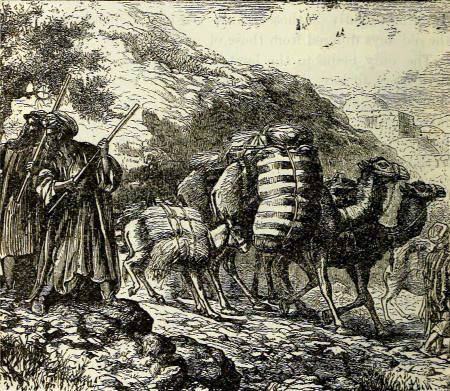
ARABS JOURNEYING TO FRESH PASTURES.
“The Arabs are creatures of necessity; their nomadic life is compulsory, as the existence of their flocks and herds depends upon the pasturage. Thus, with the change of seasons they must change their localities according to the presence of fodder for their cattle…. The Arab cannot halt in one spot longer than the pasturage will support his flocks. The object of his life being fodder, he must wander in search of the ever-changing supply. His wants must be few, as the constant change of encampment necessitates the transport of all his household goods; thus he reduces to a minimum his domestic furniture and utensils.…
“This striking similarity to the descriptions of the Old Testament is exceedingly interesting to a traveller when residing among these curious and original people. With the Bible in one’s hand, and these unchanged tribes before the eyes, there is a thrilling illustration of the sacred record; the past becomes the present, the veil of three thousand years is raised, and the living[179] picture is a witness to the exactness of the historical description. At the same time there is a light thrown upon many obscure passages in the Old Testament by the experience of the present customs and figures of speech of the Arabs, which are precisely those that were practised at the periods described….
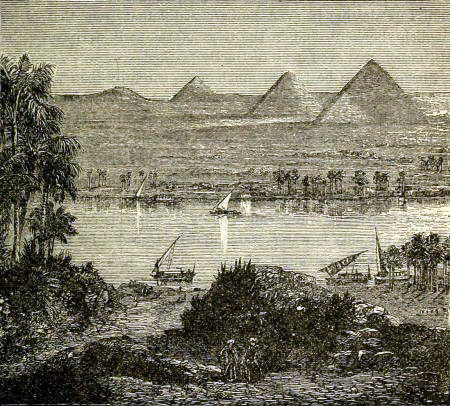
VIEW OF THE PYRAMIDS.
“Should the present history of the country be written by an Arab scribe, the style of the description would be precisely that of the Old Testament. There is a fascination in the unchangeable features of the Nile regions. There are the vast pyramids that have defied time, the river upon which Moses was cradled in infancy, the same sandy desert through which he led his people, and the watering-places where their flocks were led to drink. The wild and wandering Arabs, who thousands of years ago dug out the wells in the wilderness, are represented by their descendants, unchanged, who now draw water from the deep wells of their forefathers, with the skins that have never altered their fashion.
“The Arabs, gathering with their goats and sheep around the[180] wells to-day, recall the recollection of that distant time when ‘Jacob went on his journey, and came into the land of the people of the east. And he looked, and behold a well in the field, and lo! there were three flocks of sheep lying by it,’ &c. The picture of that scene would be an illustration of Arab daily life in the Nubian deserts, where the present is a mirror of the past.”

[In this passage, the author is talking about Jacob’s Journey from Canaan to Paddan-Aram to find a wife. Before that, Jacob had lived in Canaan, where his father Isaac lived. Paddan Aram is also called Haran.

[“Paddan Aram designates the area of Harran in upper Mesopotamia. “Paddan Aram” and “Haran” may be dialectical variations regarding the same locality as paddanū and harranū are synonyms for “road” or “caravan route” in Akkadian. Padan-aram or Padan appears in 11 verses in the Hebrew Bible, all in Genesis.” Wikipedia]
Jacob Arrives in Paddan Aram
29 Then Jacob continued on his journey and came to the land of the eastern peoples. 2 There he saw a well in the open country, with three flocks of sheep lying near it because the flocks were watered from that well. The stone over the mouth of the well was large. 3 When all the flocks were gathered there, the shepherds would roll the stone away from the well’s mouth and water the sheep. Then they would return the stone to its place over the mouth of the well. Genesis 29: 1-2 NIV Bible Gateway

[“PADDAN, PADDAN-ARAM pă’ dən, pă’ dən âr’ əm (פַּדַּ֖ן אֲרָ֑ם, field or plain of Aram) KJV PADAN, PADAN-ARAM. The area of Upper Mesopotamia around Harran, upstrem of the junction of the Rivers Euphrates and Harbur (Gen 25:20; 28:2; 31:18). The tribes called Arameans are first mentioned by the Assyrian king Shalmaneser I about 1300 b.c. and they continued to occupy the territory from Aleppo to the Euphrates and beyond, into the Christian era. The strategic importance of this sector of the Fertile Crescent is given some mention in the OT. Here Abraham dwelt before his emigration to Canaan. He sent his servant to it, to procure a bride for his son, Isaac, and to the same area Jacob fled and dwelt with Laban.
“Originally, the word padanu in Assyrian cuneiform tablets signified a unit of measurement and later a measure of land.” Paddan, Paddan-Aram – Encyclopedia of the Bible – Bible Gateway. www.biblegateway.com/resources/encyclopedia-of-the-bible/Paddan-Paddan-Ara

Jacob Returns to Canaan, Copyright © 2020 by David P. Barrett. All rights reserved.]
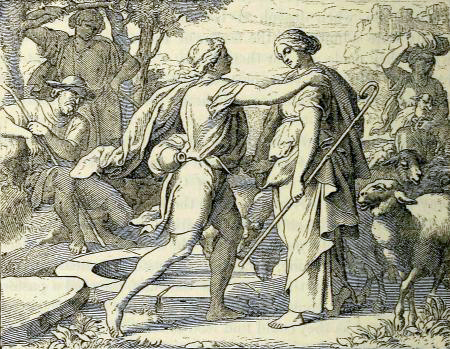
Jacob Meets Rachel
“Owing to the great number of Sheep which they have to tend, and the peculiar state of the country, the life of the shepherd in Palestine is even now very different from that of an English shepherd, and in the days of the early Scriptures the distinction was even more distinctly marked.

[Water is a major theme in the Bible. Perhaps that is because water was so very essential to the nomadic people in the Bible. Consider the 23rd Psalm. 2 He makes me lie down in green pastures, he leads me beside quiet waters….”
Psalm 23
A psalm of David.
1 The Lord is my shepherd, I lack nothing.
2 He makes me lie down in green pastures,
he leads me beside quiet waters,
3 he refreshes my soul.
He guides me along the right paths
for his name’s sake.
4 Even though I walk
through the darkest valley,[a]

[This alludes to darkness again, which we discussed on January 1]
I will fear no evil,
for you are with me;

your rod and your staff,
they comfort me. [Shepherd]
5 You prepare a table before me
in the presence of my enemies.
You anoint my head with oil;
my cup overflows.
6 Surely your goodness and love will follow me
all the days of my life,
and I will dwell in the house of the Lord
forever.
Footnotes
- Psalm 23:4 Or the valley of the shadow of death
[NIV Bible Gaeway]
“Sheep had to be tended much more carefully than we generally think. In the first place, a thoughtful shepherd had always one idea before his mind,—namely, the possibility of obtaining sufficient water for his flocks. Even pasturage is less important than water, and, however tempting a district might be, no shepherd would venture to take his charge there if he were not sure of obtaining water. In a climate such as ours, this ever-pressing anxiety respecting water can scarcely be appreciated, for in hot climates not only is water scarce, but it is needed far more than in a temperate and moist climate. Thirst does its work with terrible quickness, and there are instances recorded where men have sat down and died of thirst in sight of the river which they had not strength to reach.
“In places therefore through which no stream runs, the wells are the great centres of pasturage, around which are to be seen vast flocks extending far in every direction. These wells are kept carefully closed by their owners, and are only opened for the use of those who are entitled to water their flocks at them.
“Noontide is the general time for watering the Sheep, and towards that hour all the flocks may be seen converging towards their respective wells, the shepherd at the head of each flock, and the Sheep following him. See how forcible becomes the imagery of David, the shepherd poet, “The Lord is my Shepherd; I shall not want. He maketh me to lie down in green pastures (or, in pastures of tender grass): He leadeth me beside the still waters” (Ps. xxiii. 1, 2). Here we have two of the principal duties of the good shepherd brought prominently before us,—namely, the[181] guiding of the Sheep to green pastures and leading them to fresh water. Very many references are made in the Scriptures to the pasturage of sheep, both in a technical and a metaphorical sense; but as our space is limited, and these passages are very numerous, only one or two of each will be taken.
“In the story of Joseph, we find that when his father and brothers were suffering from the famine, they seem to have cared as much for their Sheep and cattle as for themselves, inasmuch as among a pastoral people the flocks and herds constitute the only wealth. So, when Joseph at last discovered himself, and his family were admitted to the favour of Pharaoh, the first request which they made was for their flocks. “Pharaoh said unto his brethren, What is your occupation? And they said unto Pharaoh, Thy servants are shepherds, both we, and also our fathers.
47 Joseph went and told Pharaoh, “My father and brothers, with their flocks and herds and everything they own, have come from the land of Canaan and are now in Goshen.” 2 He chose five of his brothers and presented them before Pharaoh.
3 Pharaoh asked the brothers, “What is your occupation?”
“Your servants are shepherds,” they replied to Pharaoh, “just as our fathers were.” 4 They also said to him, “We have come to live here for a while, because the famine is severe in Canaan and your servants’ flocks have no pasture. So now, please let your servants settle in Goshen.” Genesis 47: 1-3 NIV Bible Gateway
“They said moreover unto Pharaoh, For to sojourn in the land are we come; for thy servants have no pasture for their flocks; for the famine is sore in the land of Canaan: now therefore, we pray thee, let thy servants dwell in the land of Goshen.”

[“The land of Goshen (Hebrew: אֶרֶץ גֹּשֶׁן, Modern: ʾEreẓ Gōšen, Tiberian: ʾEreṣ Gōšen) is named in the Hebrew Bible as the place in Egypt given to the Hebrews by the pharaoh of Joseph (Book of Genesis, Genesis 45:9–10), and the land from which they later left Egypt at the time of the Exodus.” Wikipedia]
“This one incident, so slightly remarked in the sacred history, gives a wonderfully clear notion of the sort of life led by Jacob and his sons. Forming, according to custom, a small tribe of their own, of which the father was the chief, they led a pastoral life, taking their continually increasing herds and flocks from place to place as they could find food for them. For example, at the memorable time when the story of Joseph begins, he was sent by his father to his brothers, who were feeding the flocks, and he wandered about for some time, not knowing where to find them. It may seem strange that he should be unable to discover such very conspicuous objects as large flocks of sheep and goats, but the fact is that they had been driven from one pasture-land to another, and had travelled in search of food all the way from Shechem to Dothan.
“In 1 Chron. iv. 39, 40, we read of the still pastoral Israelites that “they went to the entrance of Gedor, even unto the east side of the valley, to seek pasture for their flocks. And they found fat pasture and good, and the land was wide, and quiet, and peaceable.”
“How it came to be quiet and peaceable is told in the context. It was peaceable simply because the Israelites were attracted by[182] the good pasturage, attacked the original inhabitants, and exterminated them so effectually that none were left to offer resistance to the usurpers. And we find from this passage that the value of good pasture-land where the Sheep could feed continually without being forced to wander from one spot to another was so considerable, that the owners of the flocks engaged in war, and exposed their own lives, in order to obtain so valuable a possession.
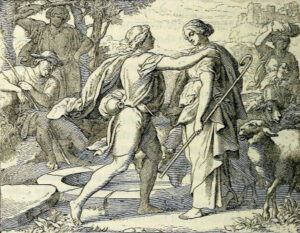
JACOB MEETS RACHEL AT THE WELL.
“We will now look at one or two of the passages that mention watering the Sheep—a duty so imperative on an Oriental shepherd, and so needless to our own.
“In the first place we find that most graphic narrative which occurs in Gen. xxix. to which a passing reference has already been made. When Jacob was on his way from his parents to the home of Laban in Padan-aram, he came upon the very well which belonged to his uncle, and there saw three flocks of Sheep lying around the well, waiting until the proper hour arrived. According to custom, a large stone was laid over the well, so as to perform the double office of keeping out the sand and dust, and of guarding the precious water against those who had no right to it. And when he saw his cousin Rachel arrive with[183]
[184] the flock of which she had the management, he, according to the courtesy of the country and the time, rolled away the ponderous barrier, and poured out water into the troughs for the Sheep which Rachel tended.
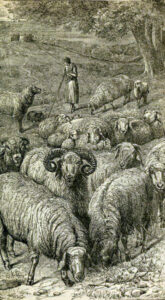
EASTERN SHEPHERD WATCHING HIS FLOCK.
About two hundred years afterwards, we find Moses performing a similar act. When he was obliged to escape into Midian on account of his fatal quarrel with a tyrannical Egyptian, he sat down by a well, waiting for the time when the stone might be rolled away, and the water be distributed. Now it happened that this well belonged to Jethro, the chief priest of the country, whose wealth consisted principally of Sheep. He entrusted his flock to the care of his seven daughters, who led their Sheep to the well and drew water as usual into the troughs. Presuming on their weakness, other shepherds came and tried to drive them away, but were opposed by Moses, who drove them away, and with his own hands watered the flock.
15 When Pharaoh heard of this, he tried to kill Moses, but Moses fled from Pharaoh and went to live in Midian, where he sat down by a well. 16 Now a priest of Midian had seven daughters, and they came to draw water and fill the troughs to water their father’s flock. 17 Some shepherds came along and drove them away, but Moses got up and came to their rescue and watered their flock.
18 When the girls returned to Reuel their father, he asked them, “Why have you returned so early today?”
19 They answered, “An Egyptian rescued us from the shepherds. He even drew water for us and watered the flock.” Exodus 2:15-19 NIV Bible Gateway
“Now in both these examples we find that the men who performed the courteous office of drawing the water and pouring it into the sheep-troughs married afterwards the girl to whose charge the flocks had been committed. This brings us to the Oriental custom which has been preserved to the present day.
“The wells at which the cattle are watered at noon-day are the meeting-places of the tribe, and it is chiefly at the well that the young men and women meet each other. As each successive flock arrives at the well, the number of the people increases, and while the sheep and goats lie patiently round the water, waiting for the time when the last flock shall arrive, and the stone be rolled off the mouth of the well, the gossip of the tribe is discussed, and the young people have ample opportunity for the pleasing business of courtship.

[I wonder if there is a connection between rolling back the stone from the wells and rolling back the stone from Jesus’ tomb:
Jesus Has Risen
28 After the Sabbath, at dawn on the first day of the week, Mary Magdalene and the other Mary went to look at the tomb.
2 There was a violent earthquake, for an angel of the Lord came down from heaven and, going to the tomb, rolled back the stone and sat on it. Matthew 28: 1-2 NIV Bible Gatewa
“As to the passages in which the wells, rivers, brooks, water-springs, are spoken of in a metaphorical sense, they are too numerous to be quoted.
“And here I may observe, that in reality the whole of Scripture has its symbolical as well as its outward signification; and that, until we have learned to read the Bible strictly according to the spirit, we cannot understand one-thousandth part of the mysteries which it conceals behind its veil of language; nor can we appreciate one-thousandth part of the treasures of wisdom which lie hidden in its pages.
[185]”Another duty of the shepherd of ancient Palestine was to guard his flock from depredators, whether man or beast. Therefore the shepherd was forced to carry arms; to act as a sentry during the night; and, in fact, to be a sort of irregular soldier. A fully-armed shepherd had with him his bow, his spear, and his sword, and not even a shepherd lad was without his sling and the great quarter-staff which is even now universally carried by the tribes along the Nile—a staff as thick as a man’s wrist, and six or seven feet in length. He was skilled in the use of all these weapons, especially in that of the sling.
DAVID GATHERS STONES FROM THE BROOK TO CAST AT GOLIATH.
“In these days, the sling is only considered as a mere toy, whereas, before the introduction of fire-arms, it was one of the most formidable weapons that could be wielded by light troops. Round and smooth stones weighing three or four ounces were the usual projectiles, and, by dint of constant practice from childhood, the slingers could aim with a marvellous precision. Of this fact we have a notable instance in David, who knew that the sling and the five stones in the hand of an active youth unencumbered by armour, and wearing merely the shepherd’s[186] simple tunic, were more than a match for all the ponderous weapons of the gigantic Philistine.
David and Goliath
17 Now the Philistines gathered their forces for war and assembled at Sokoh in Judah. They pitched camp at Ephes Dammim, between Sokoh and Azekah. 2 Saul and the Israelites assembled and camped in the Valley of Elah and drew up their battle line to meet the Philistines. 3 The Philistines occupied one hill and the Israelites another, with the valley between them.
4 A champion named Goliath, who was from Gath, came out of the Philistine camp. His height was six cubits and a span.[a] 5 He had a bronze helmet on his head and wore a coat of scale armor of bronze weighing five thousand shekels[b]; 6 on his legs he wore bronze greaves, and a bronze javelin was slung on his back. 7 His spear shaft was like a weaver’s rod, and its iron point weighed six hundred shekels.[c] His shield bearer went ahead of him.
8 Goliath stood and shouted to the ranks of Israel, “Why do you come out and line up for battle? Am I not a Philistine, and are you not the servants of Saul? Choose a man and have him come down to me. 9 If he is able to fight and kill me, we will become your subjects; but if I overcome him and kill him, you will become our subjects and serve us.” 10 Then the Philistine said, “This day I defy the armies of Israel! Give me a man and let us fight each other.” 11 On hearing the Philistine’s words, Saul and all the Israelites were dismayed and terrified.
12 Now David was the son of an Ephrathite named Jesse, who was from Bethlehem in Judah. Jesse had eight sons, and in Saul’s time he was very old. 13 Jesse’s three oldest sons had followed Saul to the war: The firstborn was Eliab; the second, Abinadab; and the third, Shammah. 14 David was the youngest. The three oldest followed Saul, 15 but David went back and forth from Saul to tend his father’s sheep at Bethlehem.
16 For forty days the Philistine came forward every morning and evening and took his stand.
17 Now Jesse said to his son David, “Take this ephah[d] of roasted grain and these ten loaves of bread for your brothers and hurry to their camp. 18 Take along these ten cheeses to the commander of their unit. See how your brothers are and bring back some assurance[e] from them. 19 They are with Saul and all the men of Israel in the Valley of Elah, fighting against the Philistines.”
20 Early in the morning David left the flock in the care of a shepherd, loaded up and set out, as Jesse had directed. He reached the camp as the army was going out to its battle positions, shouting the war cry. 21 Israel and the Philistines were drawing up their lines facing each other. 22 David left his things with the keeper of supplies, ran to the battle lines and asked his brothers how they were. 23 As he was talking with them, Goliath, the Philistine champion from Gath, stepped out from his lines and shouted his usual defiance, and David heard it. 24 Whenever the Israelites saw the man, they all fled from him in great fear.
25 Now the Israelites had been saying, “Do you see how this man keeps coming out? He comes out to defy Israel. The king will give great wealth to the man who kills him. He will also give him his daughter in marriage and will exempt his family from taxes in Israel.”
26 David asked the men standing near him, “What will be done for the man who kills this Philistine and removes this disgrace from Israel? Who is this uncircumcised Philistine that he should defy the armies of the living God?”
27 They repeated to him what they had been saying and told him, “This is what will be done for the man who kills him.”
28 When Eliab, David’s oldest brother, heard him speaking with the men, he burned with anger at him and asked, “Why have you come down here? And with whom did you leave those few sheep in the wilderness? I know how conceited you are and how wicked your heart is; you came down only to watch the battle.”
29 “Now what have I done?” said David. “Can’t I even speak?” 30 He then turned away to someone else and brought up the same matter, and the men answered him as before. 31 What David said was overheard and reported to Saul, and Saul sent for him.
32 David said to Saul, “Let no one lose heart on account of this Philistine; your servant will go and fight him.”
33 Saul replied, “You are not able to go out against this Philistine and fight him; you are only a young man, and he has
48 As the Philistine moved closer to attack him, David ran quickly toward the battle line to meet him. 49 Reaching into his bag and taking out a stone, he slung it and struck the Philistine on the forehead. The stone sank into his forehead, and he fell facedown on the ground.
50 So David triumphed over the Philistine with a sling and a stone; without a sword in his hand he struck down the Philistine and killed him. I Samuel 17 NIV Bible Gateway

Image Credit Bible Gateway
The Battle at Elah, Copyright © 2020 by David P. Barrett. All rights reserved.
“It has sometimes been the fashion to attribute the successful aim of David to a special miracle, whereas those who are acquainted with ancient weapons know well that no miracle was wrought, because none was needed; a good slinger at that time being as sure of his aim as a good rifleman of our days.
“The sling was in constant requisition, being used both in directing the Sheep and in repelling enemies: a stone skilfully thrown in front of a straying Sheep being a well-understood signal that the animal had better retrace its steps if it did not want to feel the next stone on its back.
“Passing his whole life with his flock, the shepherd was identified with his Sheep far more than is the case in this country. He knew all his Sheep by sight, he called them all by their names, and they all knew him and recognised his voice. He did not drive them, but he led them, walking in their front, and they following him. Sometimes he would play with them, pretending to run away while they pursued him, exactly as an infant-school teacher plays with the children.
“Consequently, they looked upon him as their protector as well as their feeder, and were sure to follow wherever he led them.
“We must all remember how David, who had passed all his early years as a shepherd, speaks of God as the Shepherd of Israel, and the people as Sheep; never mentioning the Sheep as being driven, but always as being led. “Thou leddest Thy people like a flock, by the hands of Moses and Aaron” (Ps. lxxvii. 20); “The Lord is my Shepherd…. He leadeth me beside the still waters” (Ps. xxiii. 1, 2); “Lead me in a plain path, because of mine enemies” (Ps. xxvii. 11); together with many other passages too numerous to be quoted.
“Our Lord Himself makes a familiar use of the same image: “He calleth his own sheep by name, and leadeth them out And when he putteth forth his own sheep, he goeth before them, and the sheep follow him: for they know his voice.”
“Although the shepherds of our own country know their Sheep by sight, and say that there is as much difference in the faces of Sheep as of men, they have not, as a rule, attained the art of teaching their Sheep to recognise their names. This custom, however, is still retained, as may be seen from a well-known passage in Hartley’s “Researches in Greece and the Levant:”—
‘Having had my attention directed last night to the words in John x. 3, I asked my man if it were usual in Greece to give names to the sheep. He informed me that it was, and that the sheep obeyed the shepherd when he called them by their names. This morning I had an opportunity of verifying the truth of this remark. Passing by a flock of sheep, I asked the shepherd the same question which I had put to the servant, and he gave me the same answer. I then bade him call one of his sheep. He did so, and it instantly left its pasturage and its companions, and ran up to the hands of the shepherd, with signs of pleasure, and with a prompt obedience which I had never before observed in any other animal.
‘It is also true that in this country, ‘a stranger will they not follow, but will flee from him.’ The shepherd told me that many of his sheep were still wild, that they had not learned their names, but that by teaching them they would all learn them.’
Generally, the shepherd was either the proprietor of the flock, or had at all events a share in it, of which latter arrangement we find a well-known example in the bargain which Jacob made with Laban, all the white Sheep belonging to his father-in-law, and all the dark and spotted Sheep being his wages as shepherd. Such a man was far more likely to take care of the Sheep than if he were merely a paid labourer; especially in a country where the life of a shepherd was a life of actual danger, and he might at any time be obliged to fight against armed robbers, or to oppose the wolf, the lion, or the bear. The combat of the shepherd David with the last-mentioned animals has already been noticed.
In allusion to the continual risks run by the Oriental shepherd, our Lord makes use of the following well-known words:—”The thief cometh not but for to steal, and to kill, and to destroy: I am come that they might have life, and have it more abundantly. I am the Good Shepherd: the good shepherd giveth his life for[189] the sheep. But he that is an hireling, … whose own the sheep are not, seeth the wolf coming, and leaveth the sheep, and fleeth: and the wolf catcheth them, and scattereth the sheep. The hireling fleeth because he is an hireling, and careth not for the sheep.”
7 Then said Jesus unto them again, Verily, verily, I say unto you, I am the door of the sheep.
8 All that ever came before me are thieves and robbers: but the sheep did not hear them.
9 I am the door: by me if any man enter in, he shall be saved, and shall go in and out, and find pasture.
10 The thief cometh not, but for to steal, and to kill, and to destroy: I am come that they might have life, and that they might have it more abundantly.
11 I am the good shepherd: the good shepherd giveth his life for the sheep.
12 But he that is an hireling, and not the shepherd, whose own the sheep are not, seeth the wolf coming, and leaveth the sheep, and fleeth: and the wolf catcheth them, and scattereth the sheep.
13 The hireling fleeth, because he is an hireling, and careth not for the sheep.
14 I am the good shepherd, and know my sheep, and am known of mine.
15 As the Father knoweth me, even so know I the Father: and I lay down my life for the sheep.
John 10: 7 – 15 Bible Gateway
“Owing to the continual moving of the Sheep, the shepherd had very hard work during the lambing time, and was obliged to carry in his arms the young lambs which were too feeble to accompany their parents, and to keep close to him those Sheep who were expected soon to become mothers. At that time of year the shepherd might constantly be seen at the head of his flock, carrying one or two lambs in his arms, accompanied by their mothers.
10 Behold, the Lord God will come with strong hand, and his arm shall rule for him: behold, his reward is with him, and his work before him.
11 He shall feed his flock like a shepherd: he shall gather the lambs with his arm, and carry them in his bosom, and shall gently lead those that are with young. Isaiah 40: 10 -11 NIV Bibe Gateway
“In allusion to this fact Isaiah writes: “His reward is with Him, and His work before Him. He shall feed His flock like a shepherd; He shall gather the lambs with His arms and carry them in His bosom, and shall gently lead them that are with young” (or, “that give suck,” according to the marginal reading). Here we have presented at once before us the good shepherd who is no hireling, but owns the Sheep; and who therefore has “his reward with him, and his work before him;” who bears the tender lambs in his arms, or lays them in the folds of his mantle, and so carries them in his bosom, and leads by his side their yet feeble mothers.
“Frequent mention is made of the folds in which the Sheep are penned; and as these folds differed—and still differ—materially from those of our own land, we shall miss the force of several passages of Scripture if we do not understand their form, and the materials of which they were built. Our folds consist merely of hurdles, moveable at pleasure, and so low that a man can easily jump over them, and so fragile that he can easily pull them down. Moreover, the Sheep are frequently enclosed within the fold while they are at pasture.
“If any one should entertain such an idea of the Oriental fold, he would not see the force of the well-known passage in which our Lord compares the Church to a sheepfold, and Himself to the door. “He that entereth not by the door into the sheepfold, but climbeth up some other way, the same is a thief and a robber. But he that entereth in by the door is the shepherd of the sheep. To him the porter openeth, and the sheep hear his[190] voice…. All that ever came before me are thieves and robbers: but the sheep did not hear them. I am the door: by me if any man enter in, he shall be saved, and shall go in and out, and find pasture.”
The Shepherd and His Sheep
10 Jesus said, “I tell you the truth. The man who does not enter the sheepfold by the door, but climbs in some other way, is a thief and a robber. 2 The one who enters by the door is the shepherd of the sheep. 3 The man who guards the door opens it for him. And the sheep listen to the voice of the shepherd. He calls his own sheep, using their names, and he leads them out. 4 He brings all of his sheep out. Then he goes ahead of them and leads them. They follow him because they know his voice. 5 But they will never follow a stranger. They will run away from him because they don’t know his voice.” 6 Jesus told the people this story, but they did not understand what it meant. John 10:1-6 NIV Bible Gateway
Jesus Is the Good Shepherd
Had the fold here mentioned been a simple enclosure of hurdles, such an image could not have been used. It is evident that the fold to which allusion was made, and which was probably in sight at the time when Jesus was disputing with the Pharisees, was a structure of some pretensions; that it had walls which a thief could only enter by climbing over them—not by “breaking through” them, as in the case of a mud-walled private house; and that it had a gate, which was guarded by a watchman.
In fact, the fold was a solid and enduring building, made of stone. Thus in Numbers xxxii. it is related that the tribes of Reuben and Gad, who had great quantities of Sheep and other[191] cattle, asked for the eastward side of Jordan as a pasture-ground, promising to go and fight for the people, but previously to build fortified cities for their families, and folds for their cattle, the folds being evidently, like the cities, buildings of an enduring nature.
In some places the folds are simply rock caverns, partly natural and partly artificial, often enlarged by a stone wall built outside it. It was the absence of these rock caverns on the east side of Jordan that compelled the Reubenites and Gadites to build folds for themselves, whereas on the opposite side places of refuge were comparatively abundant.
See, for example, the well-known history related in 1 Sam. xxiii.-xxiv. David and his miscellaneous band of warriors, some six hundred in number, were driven out of the cities by the fear of Saul, and were obliged to pass their time in the wilderness, living in the “strong holds” (xxiii. 14, 19), which we find immediately afterwards to be rock caves (ver. 25). These caves were of large extent, being able to shelter these six hundred warriors, and, on one memorable occasion, to conceal them so completely as they stood along the sides, that Saul, who had just come out of the open air, was not able to discern them in the dim light, and David even managed to approach him unseen, and cut off a portion of his outer robe.
That this particular cave was a sheepfold we learn from xxiv. 2-4: “Then Saul took three thousand chosen men out of all Israel, and went to seek David and his men upon the rocks of the wild goats. And he came to the sheepcotes by the way.” Into these strongholds the Sheep are driven towards nightfall, and, as the flocks converge towards their resting-place, the bleatings of the sheep are almost deafening.
The shepherds as well as their flocks found shelter in these caves, making them their resting-places while they were living the strange, wild, pastoral life among the hills; and at the present day many of the smaller caves and “holes of the rock” exhibit the vestiges of human habitation in the shape of straw, hay, and other dried herbage, which has been used for beds, just as we now find the rude couches of the coast-guard men in the cliff caves of our shores.
The dogs which are attached to the sheepfolds were, as they are now, the faithful servants of man, although, as has already[192] been related, they are not made the companions of man as is the case with ourselves. Lean, gaunt, hungry, and treated with but scant kindness, they are yet faithful guardians against the attack of enemies. They do not, as do our sheepdogs, assist in driving the flocks, because the Sheep are not driven, but led, but they are invaluable as nocturnal sentries. Crouching together outside the fold, in little knots of six or seven together, they detect the approach of wild animals, and at the first sign of the wolf or the jackal they bark out a defiance, and scare away the invaders. It is strange that the old superstitious idea of their uncleanness should have held its ground through so many tens of centuries; but, down to the present day, the shepherd of Palestine, though making use of the dog as a guardian of his flock, treats the animal with utter contempt, not to say cruelty, beating and kicking the faithful creature on the least provocation, and scarcely giving it sufficient food to keep it alive.
Sometimes the Sheep are brought up by hand at home. “House-lamb,” as we call it, is even now common, and the practice of house-feeding peculiar in the old Scriptural times.
We have an allusion to this custom in the well-known parable of the prophet Nathan: “The poor man had nothing, save one little ewe lamb, which he had bought and nourished up: and it grew up together with him, and with his children; it did eat of his own meat, and drank of his own cup, and lay in his bosom, and was unto him as a daughter” (2 Sam. xii. 3). A further, though less distinct, allusion is made to this practice in Isaiah vii. 21: “It shall come to pass in that day, that a man shall nourish a young cow, and two sheep.”
How the Sheep thus brought up by hand were fattened may be conjectured from the following passage in Mr. D. Urquhart’s valuable work on the Lebanon:—
“In the month of June, they buy from the shepherds, when pasturage has become scarce and sheep are cheap, two or three sheep; these they feed by hand. After they have eaten up the old grass and the provender about the doors, they get vine leaves, and, after the silkworms have begun to spin, mulberry leaves. They purchase them on trial, and the test is appetite. If a sheep does not feed well, they return it after three days. To increase their appetite they wash them twice a day, morning and evening, a care they never bestow on their own bodies.
“If the sheep’s appetite does not come up to their standard, they use a little gentle violence, folding for them forced leaf-balls and introducing them into their mouths. The mulberry has the property of making them fat and tender. At the end of four months the sheep they had bought at eighty piastres will sell for one hundred and forty, or will realize one hundred and fifty.
“The sheep is killed, skinned, and hung up. The fat is then removed; the flesh is cut from the bones, and hung up in the sun. Meanwhile, the fat has been put in a cauldron on the fire, and as soon as it has come to boil, the meat is laid on. The proportion of the fat to the lean is as four to ten, eight ‘okes’ fat and twenty lean. A little salt is added, it is simmered for an hour, and then placed in jars for the use of the family during the year.
“The large joints are separated and used first, as not fit for keeping long. The fat, with a portion of the lean, chopped fine, is what serves for cooking the ‘bourgoul,’ and is called Dehen. The sheep are of the fat-tailed variety, and the tails are the great delicacy.”
This last sentence reminds us that there are two breeds of Sheep in Palestine. One much resembles the ordinary English Sheep, while the other is a very different animal. It is much taller on its legs, larger-boned, and long-nosed. Only the rams have horns, and they are not twisted spirally like those of our own Sheep, but come backwards, and then curl round so that the point comes under the ear. The great peculiarity of this Sheep is the tail, which is simply prodigious in point of size, and is an enormous mass of fat. Indeed, the long-legged and otherwise lean animal seems to concentrate all its fat in the tail, which, as has been well observed, appears to abstract both flesh and fat from the rest of the body. So great is this strange development, that the tail alone will sometimes weigh one-fifth as much as the entire animal. A similar breed of Sheep is found in Southern Africa and other parts of the world. In some places, the tail grows to such an enormous size that, in order to keep so valuable a part of the animal from injury, it is fastened to a small board, supported by a couple of wheels, so that the Sheep literally wheels its own tail in a cart.
Frequent reference to the fat of the tail is made in the Authorized Version of the Scriptures, though in terms which[195] would not be understood did we not know that the Sheep which is mentioned in those passages is the long-tailed Sheep of Syria. See, for example, the history narrated in Exod. xxix. 22, where special details are given as to the ceremony by which Aaron and his sons were consecrated to the priesthood. “Thou shalt take of the ram the fat and the rump, and the fat that covereth the inwards, and the caul above the liver, and the two kidneys, and the fat that is upon them.”
“Story of the Bible Animals by J. G. Wood.” Project Gutenberg, gutenberg.org/ebooks/44685
